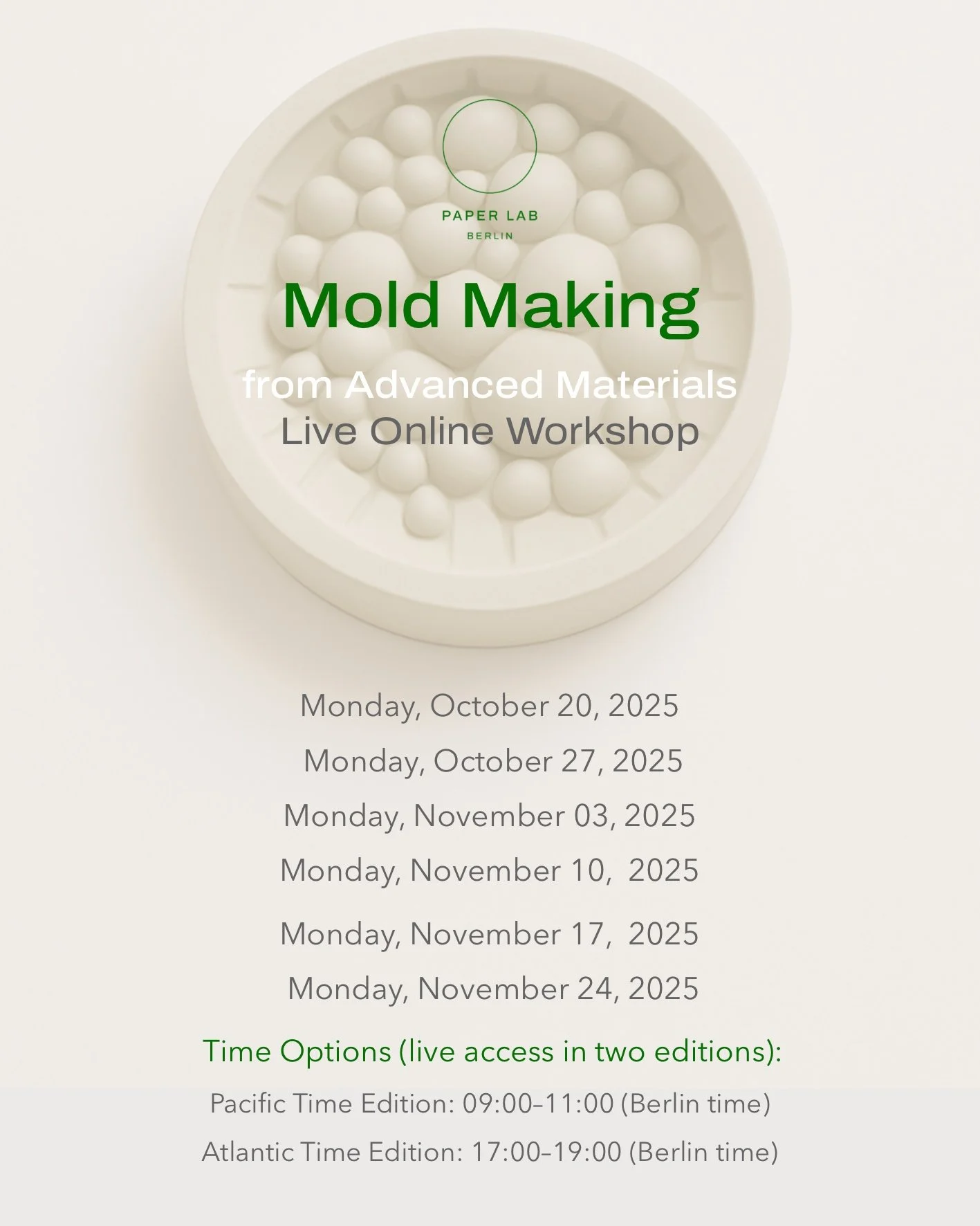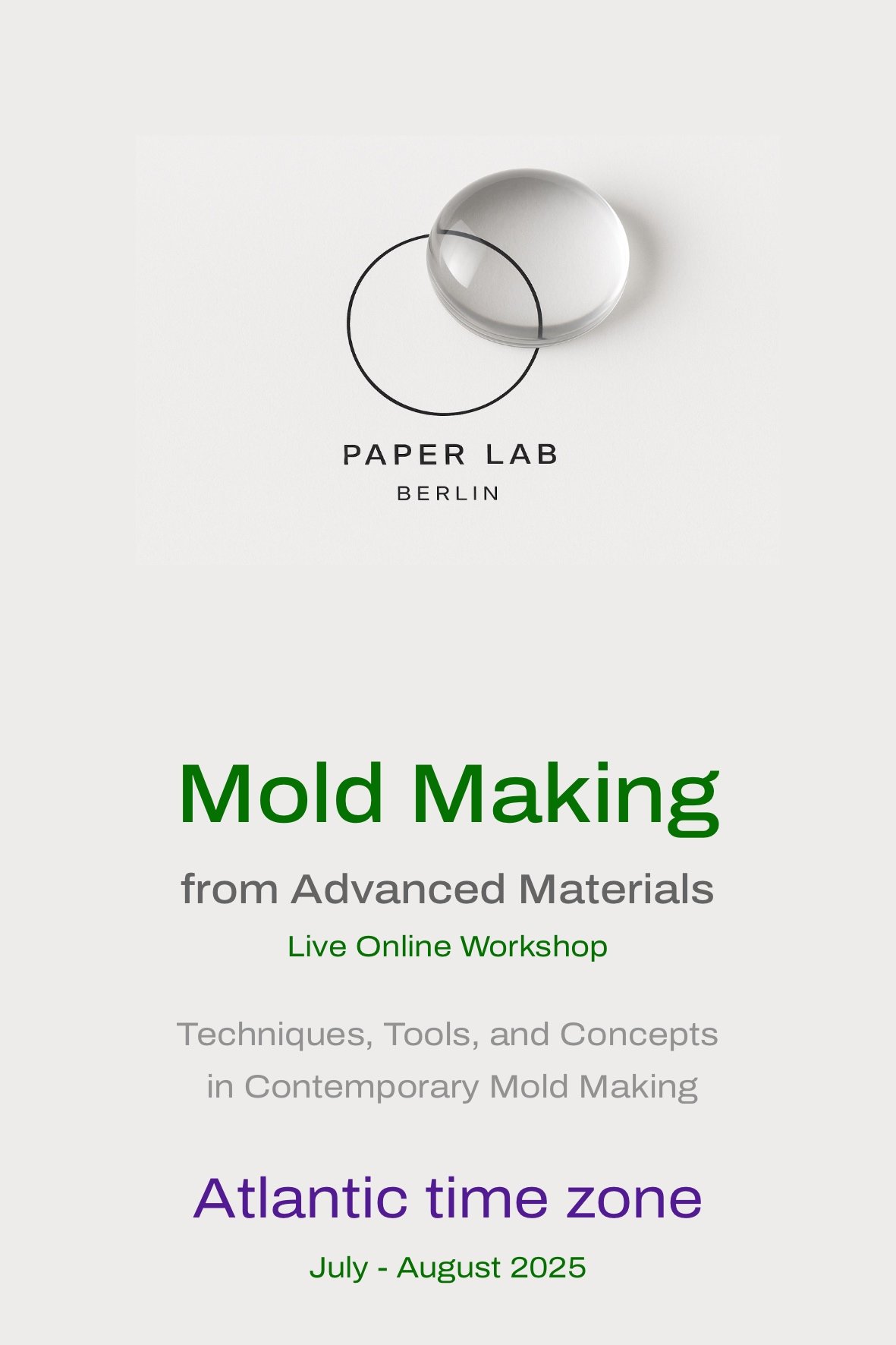
Introductory session:
An Introductory video session is available.
Kindly reach out to us and we will send it to you
Workshop Overview
This six-session online workshop offers a deep and structured entry into the world of contemporary mold making. Designed for artists, researchers, and material thinkers, it explores the technical foundations and creative potentials of working with advanced mold-making materials.
Over six sessions, we will examine a full spectrum of techniques and systems used to create high-fidelity molds and casts—from sculpting and shaping to casting and release. Our study will focus on both the theory and practice of mold making, with attention to conceptual clarity, material behavior, and detailed methodology.
We will explore a wide range of materials, including silicone (tin- and platinum-cure), urethane rubber, polymeric clays, alginates, foams, and resins. Each will be studied in depth in relation to safety, compatibility, behavior, and long-term use. Additionally, we will address support systems such as separator agents, structural additives, fillers, and hybrid approaches.
A unique aspect of this workshop is the inclusion of detailed guidance on casting with paper-based materials, including recycled pulp, fabric-derived fiber, and plant-based pulps. Participants will learn how to work with fragile substances within high-precision mold systems—offering new applications for paper and pulp in the world of casting.
What This Workshop Offers
A comprehensive study of contemporary mold-making systems and logic
Step-by-step instruction in mixing, building, brushing, reinforcing, and releasing molds
Visual depth: high-resolution presentations, video guides, and process diagrams
Strategies for integrating advanced materials with fragile casting mediums like paper pulp
Continuous support: all participants receive recordings, illustrated presentations, and curated links for tools and resources
Optional assignments between sessions, with feedback via the Paper Lab community platform
Materials & Learning Process
Participants are not required to purchase materials before the course begins. As the sessions unfold, each participant will receive tailored sourcing guidance aligned with their casting goals and region.
This workshop is non-branded. While we do not promote any specific company, we guide participants on how to find appropriate materials available in their country.
Each session offers both theoretical insights and visual clarity, along with options for practical implementation. Participants are invited to experiment between sessions and receive support and feedback from the Paper Lab team.
Who Should Join
This course is intended for those seeking a serious, structured, and material-conscious approach to mold making. Ideal for:
Artists working with casting, repetition, or surface preservation
Papermakers and sculptors exploring fragile, fiber-based substances
Designers, educators, and researchers interested in material systems
Interdisciplinary makers wanting to develop advanced mold-making fluency
Paper Lab's platform emphasizes material literacy, process awareness, and research-led experimentation.
This workshop is shaped by those same values.
Workshop Content
Session 1: Mold Logic – Foundations and Natural Intelligence
Introduction to mold-making as a language of presence and absence
Historical and natural mold-making methods
Core principles: imprint, reversal, containment
Temporary mold systems: clay, ice, sand, alginate
First practice: casting paper into simple molds
Session 2: Silicone – Precision, Properties, and Applications
Tin-cure vs. platinum-cure silicone
Brush-on, pourable, and putty forms
Shore hardness, inhibition, and cure logic
Mold design for fragile, dimensional, or repeated casting
Paper casting into silicone: absorption, layering, and separation
Session 3: Clay and Rubber – Sculpting, Molding, Translating Form
Polymeric clays (NSP soft/medium/hard) for two-part molds
Using clay as both modeling and mold material
Natural and synthetic rubber systems
Release strategies and mold complexity
Rubber molds for soft-to-rigid and multi-material casting
Session 4: Urethanes – Molds, Resins, and Structural Casts
Urethane rubber and urethane resins: behavior and uses
Open-cell and rigid foam systems
Casting behavior vs. silicone molds
Containment, cure control, and failure prevention
Paper casting into urethane molds: structure and fidelity
Session 5: Resins and Special Systems – Translating Fragility
Synthetic and natural resins: use, safety, and visual properties
Additives, fillers, and pigmentation logic
Separator agents: types and applications
Cross-mapping materials: how silicone, clay, rubber, and foam serve as molds
Integrating pulp and fragile materials with resin-compatible molds
Session 6: Paper-Based Casting – Strategies, Adaptations, and Depth
Casting with plant-based, recycled, and textile-derived pulps
Pulp formulas and their casting behavior
Layering and drying logic for paper-based materials in molds
Final considerations: preservation, failure, surface control
Closing discussion: conceptual insights and individual guidance
Structure and Format
Six live sessions, 2 hours each via Zoom
Includes Q&A, community discussion, and feedback periods
All sessions recorded and archived for participant access
Each session includes:
A full illustrated presentation
High-resolution reference images and diagrams
Curated resource lists
Demonstration videos
Suggested experiments and exercises
Personalized follow-up support
What You Will Learn
Foundations and logic of mold making
How to build one-part, two-part, and brush-on molds
Matching materials to casting goals (fragile, rigid, elastic)
Casting methods for advanced materials and fiber-based substances
Best practices for layering, separating, and preserving fragile casts
Each session integrates core casting knowledge with dedicated examples and methods for paper-based materials, helping participants confidently navigate mold making across both traditional and experimental surfaces.
Key Concepts Explored
Mold Making as Natural Intelligence: Tracing form through touch, reversal, and ecology
Paper as Mold Logic: How paper’s origins inform casting with fiber
Dual States: Understanding cast and mold as shifting systems
Opposites in Contact: Flexibility vs. rigidity, preservation vs. loss
Failure as Instruction: Learning through collapse, error, and adaptation
Pressure and Preservation: Molds as recorders of memory and repetition
Final Note
This is a professional, research-driven workshop for artists and makers who wish to engage deeply with mold making. It is not a hobby course. Whether you are building complex silicone molds, translating a paper sculpture into resin, or shaping soft forms from foam and fiber, this course is here to offer structure, rigor, and conceptual clarity.
You will leave with tools not only for craft, but for sustained experimentation and material investigation in your own work.
Workshop Formats: Live and At Your Own Pace
This workshop is available in two formats to accommodate different learning styles and schedules: a live online edition and a fully flexible "At Your Own Pace" program.
Flexible Learning
Access all workshop materials at your convenience. This includes detailed video presentations, step-by-step demonstrations, and comprehensive documentation of processes. You can learn and experiment at your own speed, making it easy to fit the workshop into your busy schedule. There is no need to adhere to specific class times; you have the freedom to progress through the material as your availability and interests allow.
Personalized Guidance
In addition to the self-paced content, you will benefit from a personalized one-on-one Zoom session. This additional session is dedicated to reviewing your work, discussing your experiments, and providing targeted feedback. During this meeting, you can address any questions you may have, receive tailored advice, and gain deeper insights into your process. This personalized guidance ensures that you receive the support you need to fully explore and develop your creative ideas—without any extra charge.
Comprehensive Access
Once you enroll, you gain permanent access to all workshop materials. This includes video recordings of each session, supplementary articles, and detailed process documentation. You can revisit these resources as often as you like, allowing for ongoing experimentation and reflection. This continuous access helps reinforce your learning and supports your long-term creative development.
As a participant in our "At Your Own Pace" program, you’ll also have the added benefit of joining any future live workshop sessions of your choice for a hands-on experience and real-time interaction.

Mold Making from Advanced Materials / October-November 2025
Mold Making from Advanced Materials
Techniques, Tools, and Concepts in Contemporary Mold Making
Live Online workshop
Session 1: Tuesday, January 20, 2026
Session 2: Tuesday, January 27, 2025
Session 3: Tuesday, February 03, 2025
Session 4: Tuesday, February 10, 2025
Session 5: Tuesday, February 17, 2025
Session 6: Tuesday, February 24, 2025
Time Options (live access in two editions):
Pacific Time Edition: 09:00–11:00 (Berlin time)
Atlantic Time Edition: 17:00–19:00 (Berlin time)

Mold Making from Advanced Materials
Mold Making from Advanced Materials
Techniques, Tools, and Concepts in Contemporary Mold Making
Live Online Workshop

Mold Making from Advanced Materials
Mold Making from Advanced Materials
Techniques, Tools, and Concepts in Contemporary Mold Making
Live Online Workshop
6 sessions:
Monday, 21.07.2025
Monday, 28.07.2025
Monday, 04.08.2025
Monday, 11.08.2025
Monday, 18.08.2025
Monday, 25.08.2025
Berlin, Central European Time (CET): 09:00 - 11:30
This workshop is perfectly timed for participants joining us from Asia, Australia, New Zealand, the Pacific, and across Europe—bringing our global community together in one shared space of creation.
Auckland, Wellington – 19:00–21:30
Sydney, Melbourne, Brisbane – 17:00–19:30
Adelaide – 16:30–19:00
Perth, Singapore, Kuala Lumpur – 15:00–17:30
Tokyo, Seoul – 16:00–18:30
New Delhi – 12:30–15:00
Dubai – 11:00–13:30
Istanbul – 10:00–12:30
















